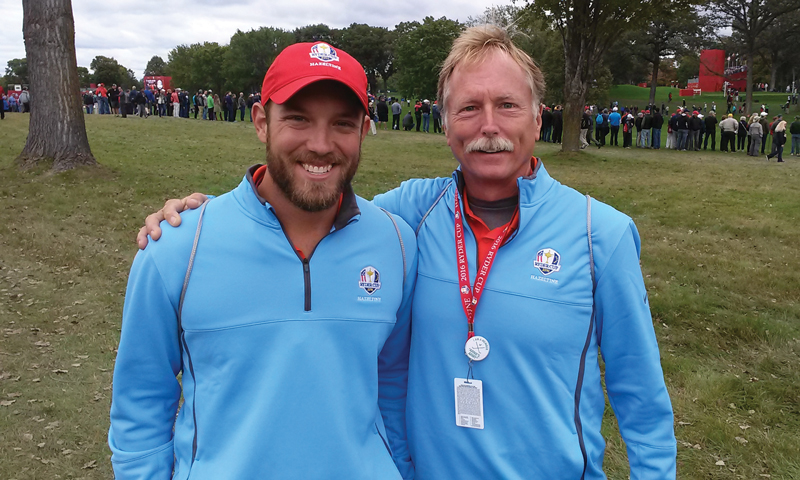
Minnesota GCSA executive director Jack MacKenzie (right) with his son, Tyler, the superintendent at Boca West Country Club in Boca Raton, Fla., and a four-year member of GCSAA. Photo by Howard Richman
It was a simple goal: Assure the public of golf’s commitment to environmental stewardship via comprehensive and voluntary golf course best management practices (BMPs) — including irrigation efficiency and crisis water management plans — in exchange for access to water, albeit in reduced quantities, upon demand. This goal was proclaimed in 2009 in Minnesota, the Land of 10,000 Lakes.
Implementing the concept, however, has been a different story for the Minnesota GCSA (MGCSA) and its allied golf industry associations, as state water management is divided among agencies — forces that don’t often work together for the enhancement of Minnesota’s resources. Also, lack of volunteer support slowed the initiative, as the promoters — golf course superintendents — were too focused during their active season to pursue the idea with vigor.
In 2012, MGCSA made a dramatic shift in its management and hired a full-time executive director with a mandate to complete the BMPs initiative. Not unlike herding cats, getting state agencies on board with the plan continued to be a challenge. After five years of agency meetings, legislative networking, industry testimonies and consistently telling the great story of golf, we’ve made headway, and the state’s golf industry is now recognized as a strong and active environmental steward.
Success can be directly attributed to the implementation of the five P’s. No, not the little p’s — “proper planning prevents poor performance” — but the following big P’s.
Proactive
MGCSA’s mantra is, “If you’re not at the table, you’re going to be on the menu.” Once we seated ourselves at the table, we became recognized not only as a group of professionals interested in the business of golf, but, more important, as stewards of the environment.
Partnerships
In 2012, MGCSA president Scottie Hines, CGCS, and vice president Roger Stewart, CGCS, reached out to the largest state-allied golf associations and the University of Minnesota to initiate a meeting to discuss environmental issues looming on the horizon. These meetings continue on an annual basis.
MGCSA also began attending public gatherings hosted by Minnesota state agencies, requesting private audiences with agency directors, and joining private organizations that had at times been critics of the industry (such as the Freshwater Society, Conservation Minnesota and the Izaak Walton League). Relationships were also secured with specific legislators seated on the Legislative Water Commission.
In 2016, MGCSA partnered with GCSAA and the University of Minnesota to promote environmental stewardship in a digital billboard campaign during the Ryder Cup at Hazeltine National Golf Club in Chaska, Minn.
Participation
MGCSA pursued and received appointments to several state agency committees. The chapter also engaged organizations through registration and recognition as supporters of many issues, from water conservation to stormwater management. In addition, MGCSA will fund and sponsor future environmental initiatives, including the Minnesota Pollinator Summit.
Presentations
Professional materials were developed and made ready for distribution and presentation to state agencies, legislators, local governments, allied associations and MGCSA meeting attendees. Testimony was prepared and provided numerous times. The state’s golf business suddenly had a recognizable face.
For the past three years, MGCSA has hosted — along with other Minnesota golf-allied associations — Golf Industry Day on the Hill, a series of events at the state Capitol to shout loud the great story of golf. Eventually, there will come a time when we pursue bills to be made into law.
Persistence
Perhaps the greatest professional advancement MGCSA made in the past six years was enlisting a full-time, motivated and engaged employee who was empowered to pursue all the above-mentioned P’s on the association’s behalf on a consistent basis. The organization had learned through previous years of limited investment — and thus marginal advancement — in advocacy that the impression of the golf industry wasn’t one of respected professionals concerned about the state’s finite resources. By retaining a competent and energized extrovert to lead the association, great strides were made in changing the perception of golf and turf managers. Hiring an interested and dedicated professional is a critical investment that cannot be overstated.
After six years of dedicated professional promotion, MGCSA has gained a position as a leader in environmental stewardship. This elevated status has allowed for the generation of four manuals focused on BMPs for Minnesota golf courses, in part using the GCSAA template, and has established a platform for important agency and legislative relationships. Although we don’t have solid assurances that the industry will always have access to irrigation water, our story has been — and will continue to be — heard throughout the state.
In Minnesota, the value of environmental advocacy and unabashed self-promotion has generated dividends well beyond the initial and ongoing investment of time and resources.
Jack MacKenzie, CGCS, a 37-year member of GCSAA, has been employed in the golf course management industry for 42 years, the past six as executive director of the Minnesota GCSA. Active in advocacy on behalf of the golf industry, Jack participates on various state agency committees, most recently on a multi-agency task force looking at stormwater and effluent reuse.